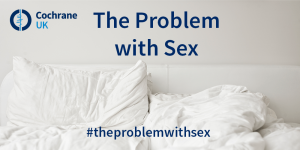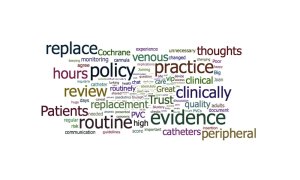Sarah Chapman revisits a blog by occupational therapist Danny Minkow on static splinting for people after stroke, adding recent evidence and guidance.
Tag: evidence-based practice
Evidence flowers: visual summaries of evidence for patients and health professionals
Opeyemi Babatude, Research Associate at Keele University, introduces “Evidence Flowers” as a novel way of providing a visual summary of research evidence.
My OCD story: evidence-based medicine to the rescue!
Karen Morley blogs about her experience of seeking help for her Obsessive-Compulsive Disorder (OCD) and how finding and using Cochrane evidence was a turning point.
From acupuncture to vitamin D: engaging the experts when the evidence is equivocal
Nurse Helen Cowan delves into the Cochrane Library to explore some 'known unknowns', and reflects on what practitioners might do when the evidence is equivocal, and what might bridge the evidence gap.
Informed decision-making: “we can” doesn’t mean “we should”
Sarah Chapman and Kit Byatt reflect on their discussion about helping an elderly relative decide whether a test and a treatment offered were in her best interests.
Cochrane evidence on catheter washouts: from Twitter to the bedside
We Nurses founder Teresa Chinn reflects on how learning about Cochrane evidence on catheter washouts enabled her to challenge and change her patient's care.
The problem with sex: a taboo that’s harming patients?
Introducing Cochrane UK's special blog series #theproblemwithsex, which aims to lift the lid on sex and chronic health conditions
Everyday practice: tried, trusted and tested? Here’s why we need evidence
Established practices may be so familiar that they aren’t questioned. They should be. We consider this here in an area of everyday nursing practice, pressure ulcer management, but hope this will be read in the context of other areas of healthcare.
Students 4 Best Evidence: new kids on the blog
In the 3rd blog of our Understanding Evidence series, Selena Ryan-Vig introduces Students 4 Best Evidence, a blogging network by and for students interested in evidence-based healthcare
Do you know about Students 4 Best Evidence?
Students 4 Best Evidence is a blogging network by students, for students, who are interested in evidence-based healthcare.
Evidence for Everyday: new for Allied Health Professionals
Introducing our new series for Allied Health Professionals: Evidence for Everyday Allied Health, which launches today
Getting evidence into nursing practice: replacing the routine
Catch up with our WeNurses tweetchat on evidence for when to change peripheral venous catheters and what's happening in practice












